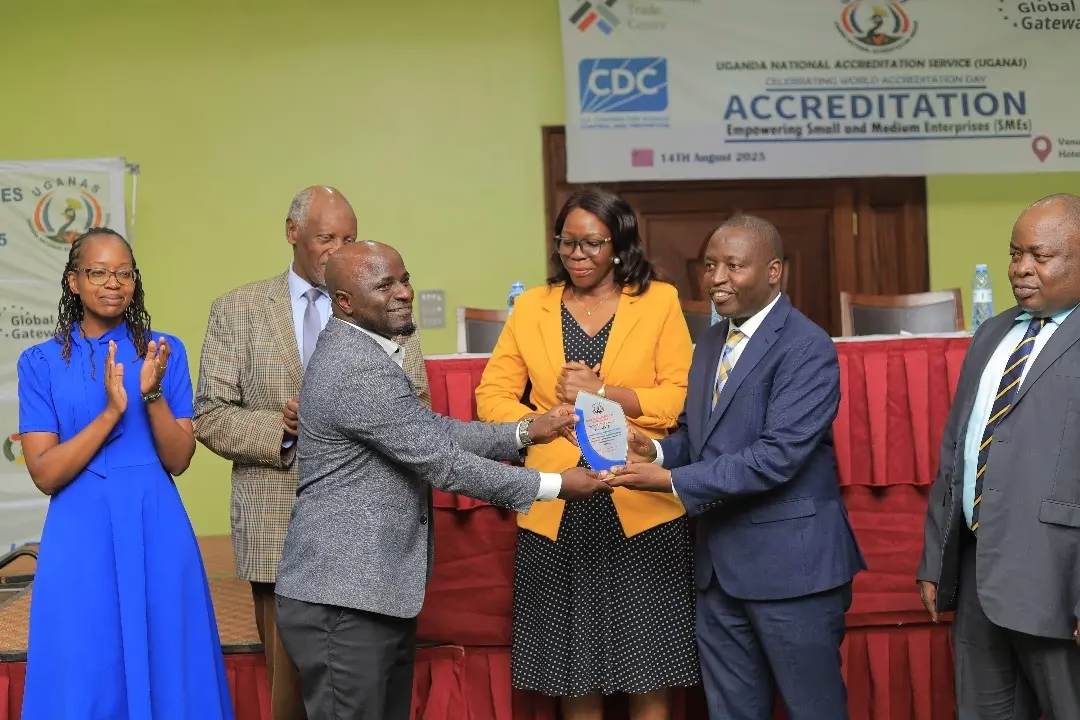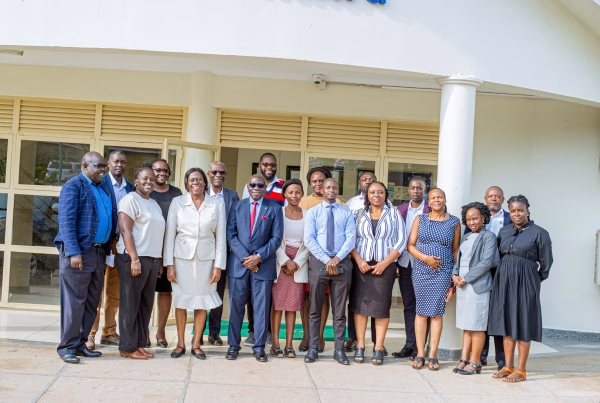Today 15th August 2025, Uganda joined the global community in celebrating World Accreditation Day at the Imperial Royale Hotel, where Hon. David Bahati, Minister of State for Trade, Industry, and Cooperatives, emphasized the critical role of accreditation in ensuring quality and credibility in health services.
During the ceremony, the Joint Clinical Research Centre (JCRC) was honored by the Uganda National Accreditation Service (UGANAS) for its pivotal contributions to the functionalisation of the national accreditation body. During the celebration ceremony, the Minister said, “Accreditation is a vital tool for strengthening Uganda’s SMEs, boosting exports, and driving economic growth.” This sentiment underscores the critical role that accreditation plays in Uganda’s economic development.
Laboratory accreditation is a rigorous process that confirms a facility meets international standards, ensuring accurate, reliable, and globally accepted results. This is crucial for patient care, disease control, and policy decisions. Accredited laboratories also benefit from mutual recognition, facilitating acceptance of results across borders, research and strengthening Uganda’s integration into global health networks.

Gordon Mpamize, Project Manager of the Strengthening Public Health Laboratory Systems (SPLHS) project, receives an award from Hon. David Bahati, Minister of State for Trade, Industry, and Cooperatives, in recognition of outstanding contributions to laboratory excellence.
For over three decades, JCRC has been at the forefront of laboratory quality and accreditation efforts in Uganda. From its humble beginnings in HIV/AIDS testing to establishing highly specialized laboratories, including a rare PATHOGENIC BSL-3 facility, JCRC has consistently pushed the boundaries of excellence.
The benefits of accreditation extend beyond the health sector, with significant implications for Uganda’s economy as it facilitates trade. With accreditation, Uganda’s SMEs can access new markets, including the East African Community (EAC), COMESA, and the African Continental Free Trade Area (AfCFTA). This can lead to increased exports, economic growth, and job creation. In fact, with robust accreditation, Uganda’s agricultural value chain exports are expected to grow from $1.5 billion to $3.5 billion by 2030. Additionally, halal-certified beef exports to the Middle East could reach $1.09 billion by 2030.
JCRC’s commitment to excellence is reflected in its own laboratories, which are registered with external quality assurance schemes and hold CAP (College of American Pathologists) accreditation. Moreover, JCRC actively supports the national lab ecosystem through initiatives like the CDC-funded Strengthening Public Health Laboratory Systems (SPHLS) programme, which aims to bolster quality management systems and drive labs toward ISO accreditation across more than 125 districts.
UGANAS plays a crucial role in this process, providing accessible accreditation services, training, and capacity-building programs to support SMEs in Uganda. UGANAS has achieved Associate Member status with the AFRAC (African Accreditation Cooperation), solidifying its regional standing. By reducing accreditation costs for SMEs by 35-40%, UGANAS is making it more affordable for them to access global markets.
As Uganda continues to build its laboratory standards framework, the reaffirmation of these efforts during World Accreditation Day shines a spotlight on the importance of robust quality systems in healthcare. JCRC’s recognition by UGANAS is not only an honor but also a testament to its commitment to advancing laboratory quality, reinforcing trust in diagnostics, patient safety and ultimately improving patient outcomes across the nation.





